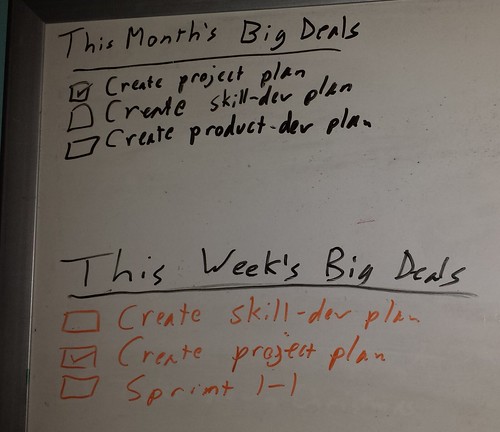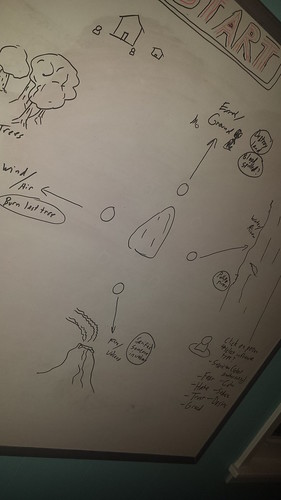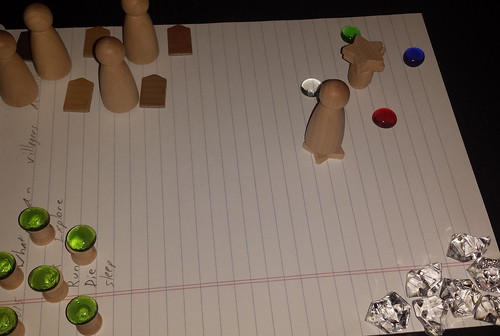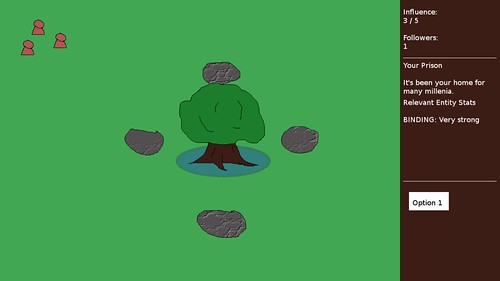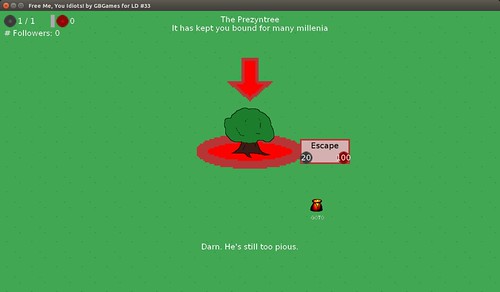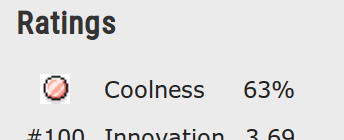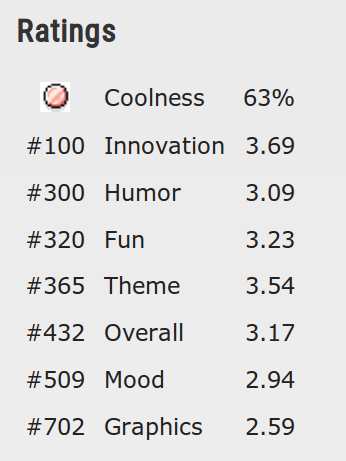I’m a white, straight, cisgender man. But I didn’t used to be.
In the past, I was just me. A unique individual human being just living his life like everyone else.
Then I started becoming aware of the fact that as a man, I live a completely different life compared to women.
I had my butt pinched once. It was by a woman passing by in a club when I was in Cancun on spring break in high school. It was such a novelty that I didn’t know how to react at the time other than with curious amazement that it happened.
All women, on the other hand, have experienced unwanted harassment from men. Some have experienced quite a bit, and some have received unwanted physical contact, and some have been physically hurt for resisting, and some have died.
And that’s just one general way in which we live different lives.
Then I started becoming aware of the fact that as a white man, I live a completely different life compared to people of color.
I got pulled over for speeding when I was in high school. I was nervous, and I got off with a warning. I had been pulled over for speeding maybe four more times, and I got a warning almost every time. One time I recall two officers on each side of my car, and another squad car appearing, and I wondered why there was so much overwhelming force. Everything was fine, though.
Black men, however, have to tell their children how to behave when, not if, they get pulled over so as not to give the officer any reason to believe they are in danger and an excuse to shoot first, ask questions later. Black drivers may drive the speed limit even if traffic is speeding around them to avoid getting into such dangerous situations in the first place. Some still get pulled over for Driving While Black. Some get harassed, some get physically hurt, and some die.
And that’s just one general way in which we live different lives.
Then I started becoming aware of the fact that as a cisgender man, I live a completely different life compared to transgender people.
One time in middle school I accidentally walked into the girls’ bathroom. It was on a different floor, and I didn’t realize I was in the wrong bathroom until I was washing my hands and noticed the lack of urinals and some strange dispensers on the wall. If I had been caught, I probably could have explained that it was an accident, and if I got in trouble anyway, it would probably have been a minor punishment.
Transgender people have entire states passing laws preventing them from peeing where they are most comfortable, which is scary because just peeing in a public bathroom has been a dangerous situation historically for them. Some have been physically beaten and some have died because other people became uncomfortable that someone different was in their bathroom.
And that’s just one general way in which we live different lives.
I used to just be a regular human being, but then I became aware of my privilege.
Privilege is about Society, not You Personally
I have a lot of privilege. I don’t have to pay attention to any of those things happening to people who aren’t white, male, and cisgender. I can continue to live my own life oblivious to it, because horrible things just generally don’t happen to me merely by virtue of me existing, and if something happens to a friend who happens to not be white or male or cisgender, well, it was probably a one-off because if it happened to me, it would be a one-off.
That’s privilege. It doesn’t mean I was given anything in life. It means societal norms are such that when I was born, I get to play the game of life on easy mode. No extra obstacles are thrown in my way due to me being me. No one is out to put me in my place, because my place by default is on top. I still have to play the game and exert effort, but I don’t have to work twice as hard to get half as much. People don’t look at me and assume I can’t possibly know what I need to know to do a job, so job interviews for software development positions don’t require nearly as much effort by me to impress as it might be for, say, a woman.
I don’t have to feel guilty about being privileged, as I didn’t specifically do anything to obtain that privilege. But I should be aware of it because how I tolerate the systems that allow that privilege means I’m basically tolerating the status quo for all of the marginalized people out there.
As uncomfortable as it may be to acknowledge this, my passive tolerance does, in fact, make me part of the problem.
But being made aware of it wasn’t easy.
Privilege is Invisible
I think it’s a much more profound challenge than it seems at first blush. It’s hard to communicate with people who have a very different frame of reference in life.
People with privilege don’t recognize that they have it, and so when they come into contact with someone who isn’t in their privilege bubble, it’s a jarring shock.
Privileged people see the world as meritocratic, and the idea that anyone has a disadvantage due to systemic issues is ridiculous specifically because they don’t see the system. To them, it’s just How Things Are.
They say things like “Why don’t you do what I did and work hard to get what you want instead of whining and hoping someone will give it to you?” without realizing that they were given the opportunity to work hard to get what they wanted without having to ask for it. They don’t see themselves as privileged because they worked hard.
They don’t see how what might be a minor and temporary inconvenience for them is yet-another-blow to someone’s dignity and welfare.
There’s that saying, “He was born on third base and acts like he hit a triple.” In a way, that’s everyone who has privilege. For people without privilege, many weren’t even allowed in the lineup.
For some (many?), being told that they need to go back to the plate to swing the bat and hit the ball before they can take a base, just like everyone else, is a setback.
Oh, and by the way, now there are more people who are allowed to participate.
It doesn’t feel like equality so much as the privileged person losing something. They start looking wistfully to the past as when things were better (specifically for them), and without getting too political about it, that’s how certain politicians seem to get so much traction with passionate voters by appealing to their bigotry.
People without privilege are much more aware of it because it is a constant issue in their lives. To them, someone with privilege must seem very obtuse. “How can they possibly not see what I see?”
It’s because their privilege is invisible to them.
So you have privileged people who don’t know they are privileged who might not have a mean bone in their bodies, and they might think of themselves as genuinely good. Yet they are part of the system. Being made aware of this fact, that they have privilege and there are systemic problems for people who don’t, and they should take some responsibility for being part of that system that allows for it, is a potentially ugly process.
Many go into denial because, hey, they are genuinely good people and don’t hate anyone! Some of their best friends are [insert non-privileged group here]! They didn’t personally do anything wrong!
And they might even be right on all of those counts, but it’s uncomfortable for them to believe that they fell down on the job of being more active in terms of even acknowledging privilege exists because it sounds like they should feel personally guilty about it.
So, if they ignore their privilege, the world goes back to the way it was when everything was a matter of pure merit and hard work, and it’s not their fault that other people are less well off.
Privilege is invisible to those who have it. Confirmation bias helps. And communication and spreading awareness is an uphill battle as a result.
Ok, You Have Privilege. Now What?
I think one challenge I’m finding is what to do now that I am aware of my privilege.
And I mean do, because being aware and not changing how I behave and act feels like it is worse than being unaware and blissfully ignorant.
I’ve been doing some research, partly for my own growth, and partly as research for my church’s efforts to ensure they are a welcoming organization for transgender people. A lot of the action steps I’m finding out there for allies are along the lines of “Don’t say this, don’t assume that, do make space.” All good, but after that, I feel like there should be more to it.
Like, ok, I get it. Don’t be a jerk, and treat everyone you meet as a human being. Learning about hurtful and appropriate language and micro aggressions and existing systemic oppression are details, but there has to be more to it, right?
I’m not saying my education is complete, nor do I want to downplay the importance of those details, but it’s one thing to see and recognize privilege, and another to do something about it.
But I feel like there’s a next step that I’m responsible for figuring out because no one is talking about it.
Most articles I’ve found for allies boil down to one of either two things: a list of do’s and don’t’s to help you be aware of your privilege, or a diatribe about how allies are failing at being real allies. It seems like every ally-related article I find focuses exclusively on the “be aware” part, or it laments how allies are falling short of actually doing more than making themselves feel better about being so progressive. There’s almost nothing out there that feels like set of a tangible actions and behaviors that would make a lasting difference.
The video game industry struggles like many industries with marginalized identities. Mattie Brice is a games critic and activist I’ve followed on Twitter for a long time who has written about this topic often. Recently she tweeted a link to her article which captures why things haven’t improved substantially despite the number of marginalized voices creating games these days.
Brice argues that despite progress on a number of fronts, it seems the status quo is still pretty much what it was, and it seems to be because that’s what supposed activists actually want.
That is, people asking for more diverse representations in games expect to play the same games we’ve always played. You know, only this time Ubisoft could figure out how to budget for the production of female models.
Right now liberal games people find the values of marginalized perspectives quaint, nice flavor that could be adapted or added on to what we already have, but not the main dish. So they aren’t necessarily against radical viewpoints, and definitely encourage them to exist, but only unsupported so change is as slow as possible.
This forces people who have the most to lose and are currently in danger to take the majority of the weight of moving things along.
This idea that marginalized people shoulder the brunt of the work of rising up against the systemic problems is something I was made aware of while talking about ways transgender people could feel more welcome at my church. I didn’t want to speak for these people as I worried it wasn’t my place to do so, but it’s exhausting for them to do everything on their own because they are fighting an uphill battle.
If I had to constantly talk about being a white, straight, cisgender man, and constantly defend every action or thought as a white, straight, cisgender man, it would, in fact, be exhausting. But since society sees me as the default, I don’t have to exert that energy.
So as an ally, what I could do is amplify marginalized voices rather than merely sit back silently. They have their own voices, and I can do much more than wait for them to feel comfortable enough to speak in a hostile environment. I can make the environment more friendly. I could share what they say.
But I could also do more.
We know that these people get less resources, both from games and society as a whole, and not changing how you consume and practicing what you value continues that divide. Said liberal masses are forcing marginalized creators into critical positions by being apathetic at best about the literal support the give while contributing to entities that maintain the status quo.
Marginalized creators don’t often have access to the marketing might of major publishers, and as a person of privilege, it’s easy for me to not even be aware that these creators exist, which contributes to their marginalization without my awareness.
From this article, I’m thinking that one of the tangible things I can do as someone with privilege is to make the extra effort to find marginalized voices. So when I think about buying a new science fiction book, for instance, rather than choose from a bestsellers list or merely on Amazon’s recommendations, I could actively seek out science fiction books written by authors I might not know about.
That’s not a difficult thing to do, but until Brice’s article, it hadn’t occurred to me to do it.
And if I address this in each aspect of my life, from where I eat to what I read children before bedtime to what movies I decide to watch to what I personally create, then I’m hopefully doing more than mere awareness and actually practicing what I value.
I’m going to continue to look for more, but being more conscious about where my dollars go is one tangible, impactful thing I can do to make privilege more visible. It doesn’t sound so hard, but I’m surprised there isn’t more about it out there.
Being that I have the awareness of my privilege to ignore injustice, it’s a moral decision not to ignore it. Being in a position of privilege, I feel obligated to do more than the bare minimum of merely not being a jerk. It will probably be exhausting work, but it’s already exhausting for the people who don’t have the privilege to avoid the work. It is wrong to sit on the sidelines and think I’m still a good person while other people suffer indignity, harassment, injustice, and death.


